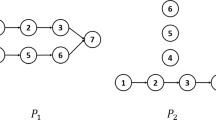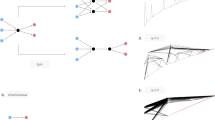Abstract
The complexity of software projects is growing with the increasing complexity of software systems. The pressure to fit schedules within shorter periods of time leads to initial project schedules with a complex logic. These schedules are often highly susceptible to any subsequent delays in project activities. Thus, techniques need to be developed to determine the quality of a software project schedule. Most of the existing measures of schedule quality define the goodness of a schedule in terms of its network complexity. However, these measures fail to estimate the flexibility of a schedule, that is, the extent to which a schedule can withstand delays without requiring extensive changes. The relatively few schedule flexibility measures that exist in literature suffer from several drawbacks such as lack of a theoretical foundation, not having a definite scale and not being able to distinguish between schedules with similar network topologies. In this paper, we address these issues by defining two flexibility measures for software project schedules, namely path shift and value shift, which, respectively, predict the impact of changes in activity durations on the critical paths and the critical value of a schedule. Inspired by the notion of betweenness centrality, these measures are theoretically sound, have a well-defined scale, and require little computational effort. Furthermore, by several examples and two real-life software project case studies, we demonstrate that these measures outperform the existing flexibility measures in clearly discriminating between the flexibility of software project schedules having very similar topologies.
Similar content being viewed by others
References
Mahmood S., Lai R., Kim Y.S., Kim J.H., Park S.C., Oh H.S.: A survey of component based system quality assurance and assessment. Inf. Softw. Technol. 47(10), 693–707 (2005)
Mahmood S., Lai R., Kim Y.S.: Survey of component based software development. IET Softw. 1(2), 57–66 (2007)
Khan M.A., Mahmood S.: A graph based requirements clustering approach for component selection. Adv. Eng. Softw. 54, 1–6 (2012)
Alshayeb M.: The impact of refactoring to patterns in software quality attributes. Arab. J. Sci. Eng. 36, 1241–1251 (2011)
Verner, J.; Brereton, O.; Kitchenham, B.; Turner, M.; Niazi, M.: Systematic literature reviews in global software development: a tertiary study. In: 16th International Conference on Evaluation and Assessment in Software Engineering (EASE 2012), pp. 2–11 (2012)
Niazi, M.; Mahmood, S.; Alshayeb, M.; Riaz, M.R.; Faisal, K.; Cerpa, N.: Challenges of project management in global software development: initial results. In: Proceedings of Science and Information Conference (SAI 2013), pp. 202–206 (2013)
Fitzgerald B.: The transformation of open source software. MIS Q. 30(3), 587–598 (2006)
Hericko A.Z.M., Rozman I.: An approach to optimizing software development team size. Inf. Process. Lett. 108(3), 101–106 (2008)
Nan N., Harter D.E.: Impact of budget and schedule pressure on software development cycle time and effort. IEEE Trans. Softw. Eng. 35(5), 624–637 (2009)
CHAOS Report 2009. The Standish Group (2009)
Smith S.F.: Is Scheduling a Solved Problem? Multidisciplinary Scheduling: Theory and Applications. Springer, Berlin (2005)
Schwalbe, K.: Information Technology Project Management, 6th edn. Course Technology, Boston (2014)
Sandru, M.; Olaru, M.: Critical path method applied to the multi project management environment. In: Proceedings of the European Conference on Management Leadership, 440 pp (2013)
Nassar K., Hegab M.Y.: Developing a complexity measure for project schedules. J. Constr. Eng. Manag. 132, 554–561 (2006)
Kiamann R.A.: Coefficient of network complexity. Manag. Sci. 21(2), 172–177 (1974)
Reyck B., Herroelen W.: On the use of the complexity index as a measure of complexity in activity networks. Eur. J. Oper. Res. 91, 347–366 (1996)
Badiru A., Pulat P.S.: Comprehensive Project Management: Integrating Optimization Models, Management Principles, and Computers. Prentice Hall, Englewood Cliffs (1995)
Davies, E.M.: An experimental investigation of resource allocation in multiactivity projects with resource restraints. Technical report, University of Birmingham, Environmental Modelling and Survey Unit, Birmingham, UK (2001)
Latva-Koivisto, A.M.: Finding a complexity measure for business process models. Technical report, Helsinki University of Technology (2001)
Whitty S.J., Maylor H.: And then came complex project management. Int. J. Proj. Manag. 27(3), 304–310 (2009)
Vidal L.-A., Marle F., Bocquet J.-C.: Measuring project complexity using the analytic hierarchy process. Int. J. Proj. Manag. 29, 718–727 (2011)
Duggan J., Byrne H., Lyons G.: A task allocation optimizer for software construction. IEEE Softw. 21(3), 76–82 (2004)
Chen W., Zhang J.: Ant colony optimization for software project scheduling and staffing with an event-based scheduler. IEEE Trans. Softw. Eng. 39(1), 1–17 (2013)
Abdel-Hamid K., Sengupta K., Ronan D.: Software project control: an experimental investigation of judgment with fallible information. IEEE Trans. Softw. Eng. 19(6), 603–612 (1993)
Abdel-Hamid K., Sengupta K., Swett C.: The impact of goals on software project management: an experimental investigation. MIS Q. 23(4), 531–555 (1999)
Ding, R.G.; Jing, X.H.: Five principles of project management in software companies. Proj. Manag. Technol. 1 (2003)
Kitchenham B.: Empirical studies of assumptions that underlie software cost-estimation models. Inf. Softw. Technol. 34(4), 211–219 (1992)
Ruhe G., Saliu M.O.: The art and science of software release planning. IEEE Softw. 22(6), 47–53 (2005)
Austin R.: The effects of time pressure on quality in software development: an agency model. Inf. Syst. Res. 12(2), 195–207 (2001)
Cesta, A.O.A.; Smith, S.F.: Profile based algorithms to solve multiple capacitated metric scheduling problems. In: Proceedings of the 4th International Conference on Artificial Intelligence Planning Systems (AIPS 98), pp. 214–223 (1998)
Policella, A.C.N.; Smith, S.F.; Oddi, A.: Generating robust schedules through temporal flexibility. In: Proceedings of the 14th International Conference on Automated Planning and Scheduling (ICAPS 2004), pp. 209–218 (2004)
Aloulou, M.; Portmann, M.: An efficient proactive reactive scheduling approach to hedge against shop floor disturbances. In: Proceedings of the 1st Multidisciplinary International Conference on Scheduling: Theory and Applications 2003 (2003)
Klimek M., Lebkowski P.: Resource allocation for robust project scheduling. Bull. Polish Acad. Sci. Tech. Sci. 59, 51–55 (2011)
Hevner A.R., Ram S., March S.T., Park J.: Design science in information systems research. MIS Q. 28(1), 75–105 (2004)
Mahmood, S.; Khan, M.A.: A degree centrality-based approach to prioritize interactions of component-based systems. In: Proceedings of 2012 International Conference on Computer and Information Science (ICCIS) 2, 863–867 (2012)
Borgatti S.P., Everett M.G.: A graph-theoretic perspective on centrality. Soc. Netw. 28, 466–484 (2005)
Kwak Y.H., Ingall L.: Exploring monte carlo simulation applications for project management. Risk Manag. 9, 44–57 (2007)
McCabe, B.: Monte carlo simulations for schedule risks. In: Chick, S., Sánchez, P.J., Ferrin, D., Morrice, D.J. (eds.) Proceedings of the 2003 Winter Simulation Conference. pp. 1561–1565 (2003)
Mckay M.D., Beckman R.J., Conover W.J.: A comparison of three methods for selecting values of input variables in the analysis of output from a computer code. Technometrics 42(1), 55–61 (2000)
Can F., Polat T., Polat F.: State of the Art Applications of Social Network Analysis. Lecture Notes in Social Networks. Springer, Berlin (2014)
Brucker P., Drexl A., Mohring K., Neumnn K., Pesch E.: Resource-constrained project scheduling: notation, classification, models and methods. Eur. J. Oper. Res. 112, 3–41 (1999)
Qi J.-J., Liu Y.-J., Lei H.-T., Guo B.: Solving the multi-mode resource availability cost problem in project scheduling based on modified particle swarm optimization. Arab. J. Sci. Eng. 39, 5279–5288 (2014)
Sadeghi H., Mousakhani M., Yazdani M., Delavari M.: Evaluating project managers by an interval decision-making method based on a new project manager competency model. Arab. J. Sci. Eng. 39, 1417–1430 (2014)
Lakhoua M.N.: Systemic analysis of an industrial system: case study of a grain silo. Arab. J. Sci. Eng. 38, 1243–1254 (2013)
Lin J.T., Wang F.-K., Wu C.: A comparison study of replenishment strategies in vendor-managed inventory. Arab. J. Sci. Eng. 39, 5253–5264 (2014)
Author information
Authors and Affiliations
Corresponding author
Rights and permissions
About this article
Cite this article
Khan, M.A., Mahmood, S. Measuring Flexibility in Software Project Schedules. Arab J Sci Eng 40, 1343–1358 (2015). https://doi.org/10.1007/s13369-015-1597-x
Received:
Accepted:
Published:
Issue Date:
DOI: https://doi.org/10.1007/s13369-015-1597-x




